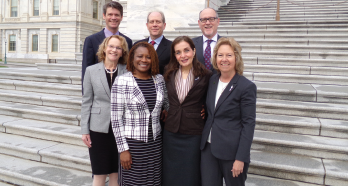
Back row from left: Angus Worthing, MD, David Karp, MD, PhD, Ken Saag, MD, MSc; Front row from left: Abby Abelson, MD, Hazel Breland, PhD, OT, FAOTA, Paula Marchetta, MD, MBA, Janet Poole, PhD, OT, FAOTA
We have often heard it said that opportunity arises from challenges. Challenge, of course, is really just a polite way of saying problem—and for our patients, problems abound when it comes to obtaining timely and affordable access to the rheumatologic care they need.
Access in this context has many meanings: There is access to life-changing treatments, which can be delayed or denied due to the need for prior authorizations, pre-approvals or step therapy. There is access that is unsustainable or untenable because of astronomical co-pays for non-formulary or less-preferred drugs—or no coverage at all for some medications. There is access that is temporally constrained because of the administrative burdens imposed on providers whose time and attention are taken away from patient care to deal with many non-clinical tasks. And there is access that is geographically constricted due to a growing workforce shortage, with so many areas of our country underserved or unserved by rheumatologists and members of the inter-professional rheumatology team.
These problems are not just our patients’ problems; they are problems for all of us in rheumatology. We know them well. We face them every day in the clinic. But what we may not know so well is that the ACR, through its advocacy work, has given us the opportunity to make a difference and lead the effort to expand access to care for our patients. As an ACR volunteer, I have seen the difference our advocacy work has made over the years, although new problems (challenges) always seem to pop up, much like a game of Whac-A-Mole.
Our work in advocacy at the ACR is geared to build access—not just our patients’ access to care and treatment, but our own access as rheumatologists and members of the inter-professional team to the lawmakers and policy makers who shape our working world and have the power to make changes that address these threats to patient access.
Let me share some examples of our advocacy efforts, along with some ways in which each of us can make a difference with our involvement.
Access to the Federal Policy Process
Congressional advocacy—The ACR opens the door for us to gain access to federal lawmakers to discuss the issues we see in our practices on a daily basis. Twice a year, in May and September, we host meetings in Washington, D.C., during which the ACR arranges for us to have face-to-face conversations with key staffers from the offices of our own senators and House representatives, with the purpose of asking them to support or sponsor legislation to help our patients and facilitate our provision of their care.
This May, members of our Board of Directors, ACR committees and leaders of state rheumatology societies converged on our nation’s capital for a series of meetings with lawmakers and staff. At these meetings, we discussed the critical need for reforms to address: